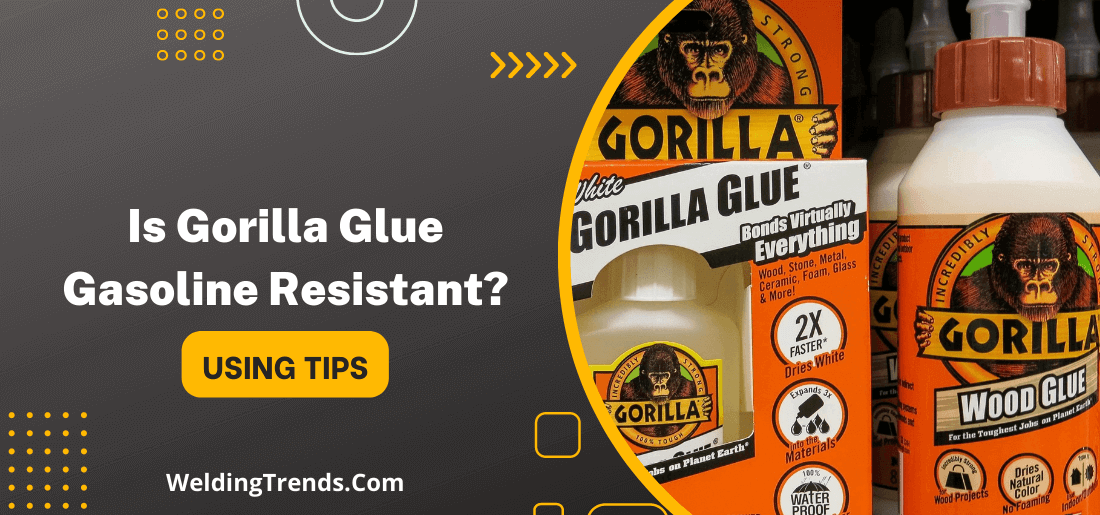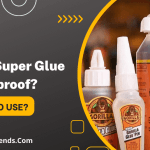Gorilla glue is one of the most popular glues on the market. It is a polyurethane adhesive, which means that it can be used for a variety of purposes. But, some people are wondering if it is resistant to gasoline.
When it comes to adhesives, gorilla glue is one of the most popular and well-known products on the market. But does it work well with gasoline?
In this blog post, we’ll take a closer look at gorilla glue and gasoline to see if they are compatible. Stay tuned for more!
Are gorilla glue gasoline resistant?
The short answer is no, Gorilla Glue is not resistant to gasoline. Gasoline will dissolve the adhesive and cause it to lose its hold. However, some adhesives are specifically designed to be used with gasoline.
If you need an adhesive that will be exposed to gasoline, we recommend doing some research to find the best option for your project.
Also, it is important to note that Gorilla Glue is flammable. It should not be used on or near any heat source, as it could catch fire. If you are working with gasoline, be sure to keep the adhesive away from any open flames or heat sources.
If we compare it to another popular glue on the market, Super Glue, we can see that it is not resistant to gasoline either. However, it is important to note that Super Glue is not as strong as Gorilla Glue. It is not recommended for use on heavier materials or for projects that require a very strong bond.
Potential Risks Associated With Gorilla Glue
Some potential risks associated with using gorilla glue include:
- Allergic reactions: Some people may be allergic to the ingredients in gorilla glue, which could cause skin irritation, swelling and other symptoms.
- Respiratory problems: The fumes from gorilla glue can be harmful to the respiratory system and may cause breathing difficulties, coughing and other respiratory symptoms.
- Eye irritation: The fumes from gorilla glue can also cause eye irritation, redness and watering.
- GI tract problems: Ingesting gorilla glue can cause stomach pain, nausea, vomiting and diarrhea.
- Skin irritation: Prolonged exposure to the glue can cause skin irritation and swelling.
- Toxicity: Ingesting or inhaling large amounts of gorilla glue can be toxic and potentially fatal.
How to remove gorilla glue from surfaces?
Gorilla glue is a powerful adhesive that can be difficult to remove from surfaces. If you have Gorilla glue on your hands, clothing or other surfaces, here are a few tips to help you remove it.
1) Remove from Skin
To remove Gorilla glue from your skin, start by wetting the area with warm water. Then, gently rub the area with a soft cloth or sponge to loosen the glue. If the Gorilla glue is still stuck to your skin, you can try using a mild soap or detergent to help remove it.
2) Remove from Clothes
To remove Gorilla glue from clothing, start by soaking the stained area in warm water for a few minutes. Then, gently rub the area with a soft cloth or sponge to loosen the glue. You can also try using a mild soap or detergent to help remove the Gorilla glue from your clothing.
3) Remove from any Surface
If you need to remove Gorilla glue from other surfaces, such as countertops or floors, you can use a putty knife or razor blade to scrape it off. You may also need to use a cleaning solution, such as vinegar or rubbing alcohol, to help remove the Gorilla glue.
When removing Gorilla glue from any surface, it’s important to be gentle so you don’t damage the surface. If you’re having trouble removing Gorilla glue, you can always contact a professional for help.
FAQs – Is gorilla glue gasoline resistant
Can I use JB weld on a gas tank?
Yes, you can use JB weld on a gas tank. However, it is important to make sure that the area is clean and free of any debris before applying the product. Additionally, it is recommended that you test the product on a small area first to ensure that it will not cause any damage to the tank.
Can you use Gorilla Glue on a car?
Yes, you can use Gorilla Glue on a car. However, you should only use it in areas that will not be exposed to sunlight or extreme temperatures, as the glue can become brittle and break down over time. Also, be sure to clean the surface of the car before applying the glue, as any dirt or debris will make it harder for the glue to adhere properly.
What epoxy will hold up to gasoline?
When it comes to gasoline, epoxy will hold up well as long as it is not exposed to direct contact with the fuel. If there is any chance of the epoxy coming into direct contact with gasoline, it is best to avoid using it.
In general, epoxy is a very strong and durable material. However, there are always exceptions to the rule. If you are unsure about whether or not epoxy will be able to hold up to gasoline, it is always best to consult with a professional. They will be able to give you the most accurate information and advice.
What does Gorilla Glue not stick to?
Gorilla Glue is an extremely versatile adhesive and can be used on a variety of surfaces, but there are a few things that it doesn’t work well with. Gorilla Glue doesn’t adhere to Teflon, polyethylene, or polypropylene plastic, so if you’re trying to glue something made of one of those materials, you’ll need to find a different adhesive. Another material that Gorilla Glue doesn’t stick to is silicone.
Wrap Up
Gorilla glue is not gasoline resistant, contrary to what some people may believe. It’s quite susceptible to the fuel and will dissolve in it over time. So if you’re looking for a strong adhesive that can stand up to gasoline, you’ll need to look elsewhere.
While it can hold up in other sticky situations, it is best to avoid using it around gasoline or any other flammable liquids.




